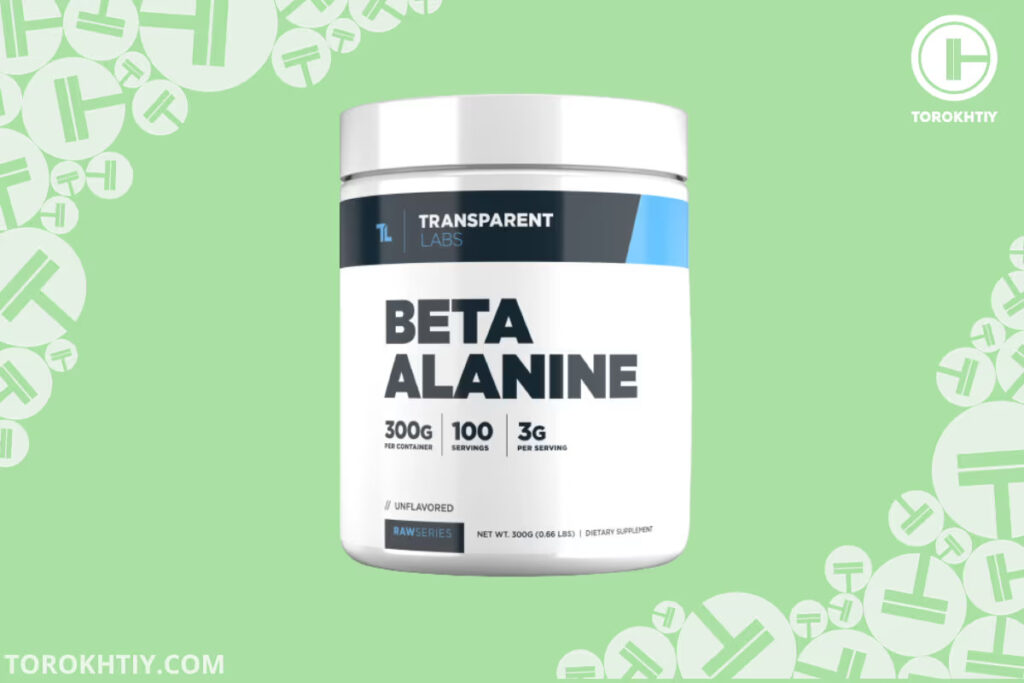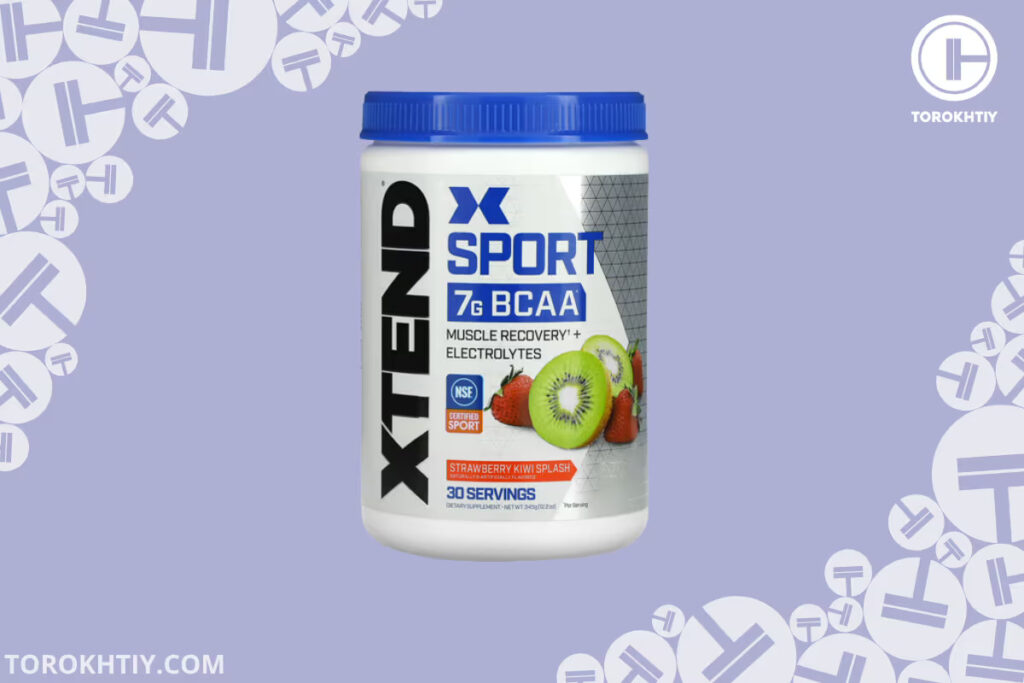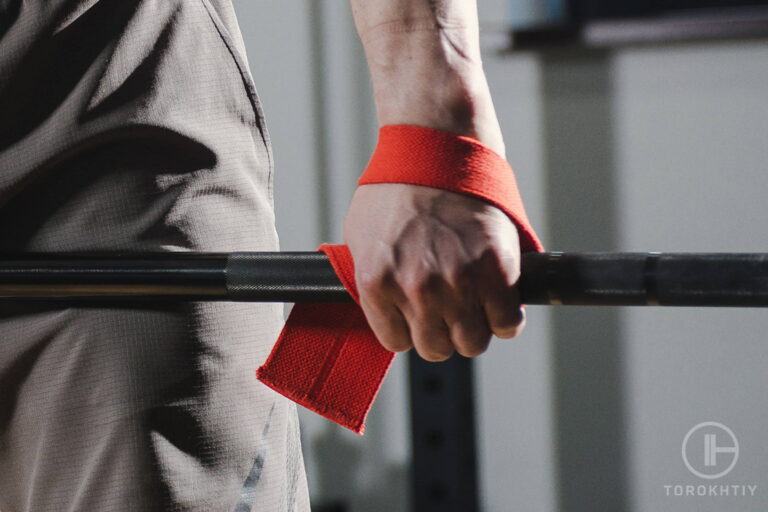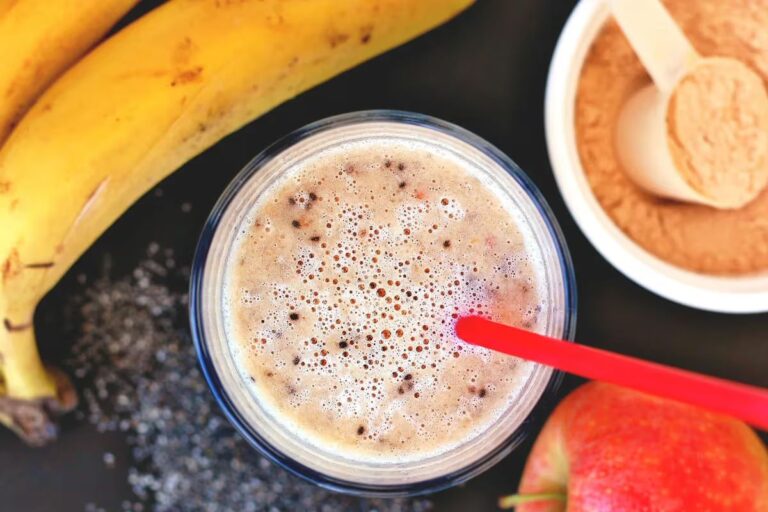Beta-Alanine vs BCAA: What’s the Difference?
Beta-alanine and BCAA are two popular supplements many people take to help improve performance and delay fatigue. However, based on your goals or needs, you might want to select one over the other and, in some cases, add both to your supplement repertoire. But how do you know which one you should take? What is the difference between beta-alanine vs. BCAA?
In this article, we’ll go over the differences between BCAA vs. beta-alanine. We’ll help you select the best option based on your needs. We’ll also go over the pros and cons of each supplement and when to take each.
The difference between beta-alanine vs. BCAA is that beta-alanine is a non-essential amino acid, while BCAAs are a group of three essential amino acids. They “both” work by decreasing fatigue and promoting endurance. However, BCAAs don’t have as much scientific evidence as beta-alanine does.
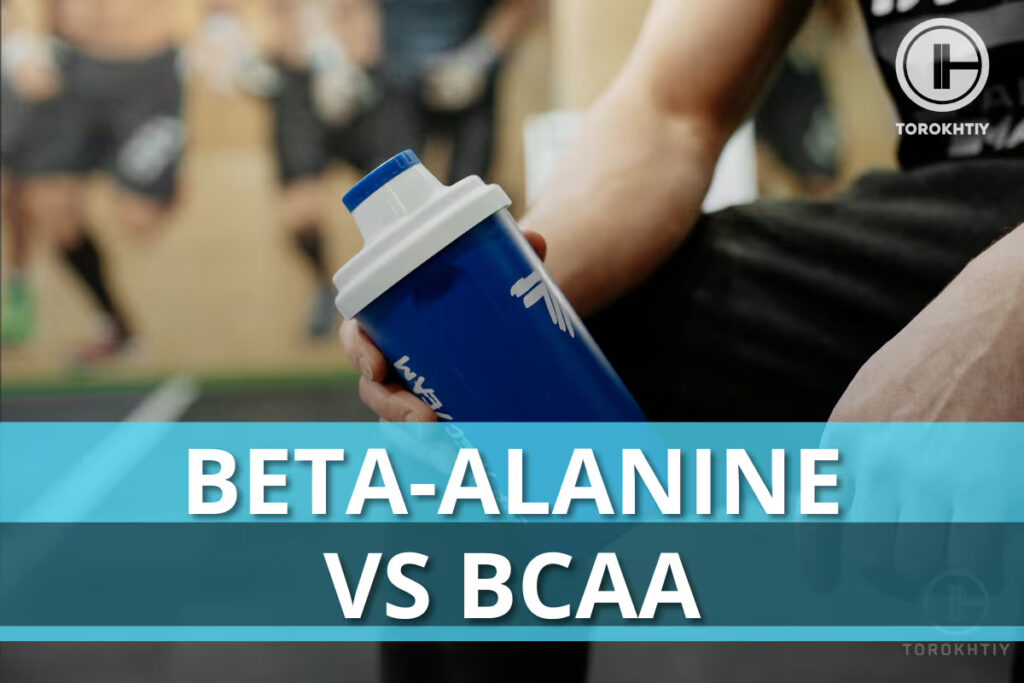
What Is Beta-Alanine?
Beta-alanine is a non-essential amino acid, meaning the body can naturally produce it in the liver. While the body naturally produces it, you can also find it in food sources, such as chicken, meat, and fish.
So, how does beta-alanine work?
The body uses glucose as an energy source when working out, and one of its byproducts is lactate and hydrogen ions (H+). As the hydrogen ions build up, the acidity levels in the muscle start to increase.
The problem with acidity buildup is that it decreases the muscle’s ability to contract, resulting in decreased performance and power.
Beta-alanine increases carnosine levels, which acts as a buffer for hydrogen ions. This can potentially help delay the onset of fatigue and enhance strength, and performance.
What Are Bcaa?
BCAA (branched-chain amino acids) are a group of essential amino acids composed of isoleucine, leucine, and valine. They are called “branched-chain” because they have branches in their molecular structure compared to other amino acids.
Since the body cannot produce them, they must come through the diet or supplement form.
It seems that they might have a positive role in helping reduce muscle damage, improve recovery, and possibly reduce fatigue. BCAA might also have a special role when glycogen stores are depleted. The body can use BCAA as an energy source during a workout, but don’t expect significantly enhanced performance. The evidence is still mixed regarding BCAA and performance.
BCAA alone are not as beneficial as when combined with other essential amino acids or other high protein sources. Basically there is no benefit in terms of muscle growth and body composition by supplementing BCAA when we consume enough protein throughout the day and many people would benefit much more (their wallets as well) by buying whey protein powder (which contain BCAA as well) instead of BCAA alone.

Beta-Alanine Vs. Bcaa
Now that we know the function between these two, let’s go over the differences between BCAA and beta-alanine.
| Feature | Beta Alanine | BCAA |
|---|---|---|
| Ingredients | Beta-alanine | L-leucine L-valine L-isoleucine |
| Dosage | 3,000 to 6,400 mg | 5-20g/Not established* Depends on the individual situation/goal |
| Main Benefits | Improve endurance. Increase strength. Delay fatigue. | Improved muscle recovery. Delayed muscle fatigue. Improved body composition. |
*The recommended dietary allowance (RDA) of BCAAs is 19 mg/kg of bw per day of isoleucine, 42 mg/kg of bw per day of leucine and 24 mg mg/kg of bw per day of valine.
1. Ingredients
One of the biggest differences between BCAA with beta-alanine is the ingredients found in each supplement.
You can find beta-alanine in pre-workout supplements, or you can also find it on its own. On the other hand, BCAAs are mostly found with other ingredients (flavorings, sweeteners, and in some cases, caffeine).
Now, keep in mind that the ingredients might vary from brand to brand, and it can also vary depending on the purpose of the supplement.
2. Dosage Timing
A typical dose of BCAAs ranges from 10 to 15 grams on a 2:1:1 ratio. In some cases, you can take it after a workout to promote recovery. However, currently there is no research stating that it’s more beneficial to use BCAAs than whey protein. In fact, it seems that compared to whey, BCAAs don’t have additional benefits, moreover whey is superior. For this reason, it might be a better option to stick to your whey protein supplement.
Now, if you want to include BCAAs, take it regularly and have it any time during the day. You can also add it before or after a workout.
On the other hand, beta-alanine is recommended in a dosage of 3,000 to 6,400 mg. Now, keep in mind that increasing the dosage can increase the risk of side effects. A dose of 3 grams seems to be a good maintenance dose. Keep in mind that in order for beta-alanine to work, you must take it consistently to raise baseline levels of carnosine. So, timing is not as important as consistency.
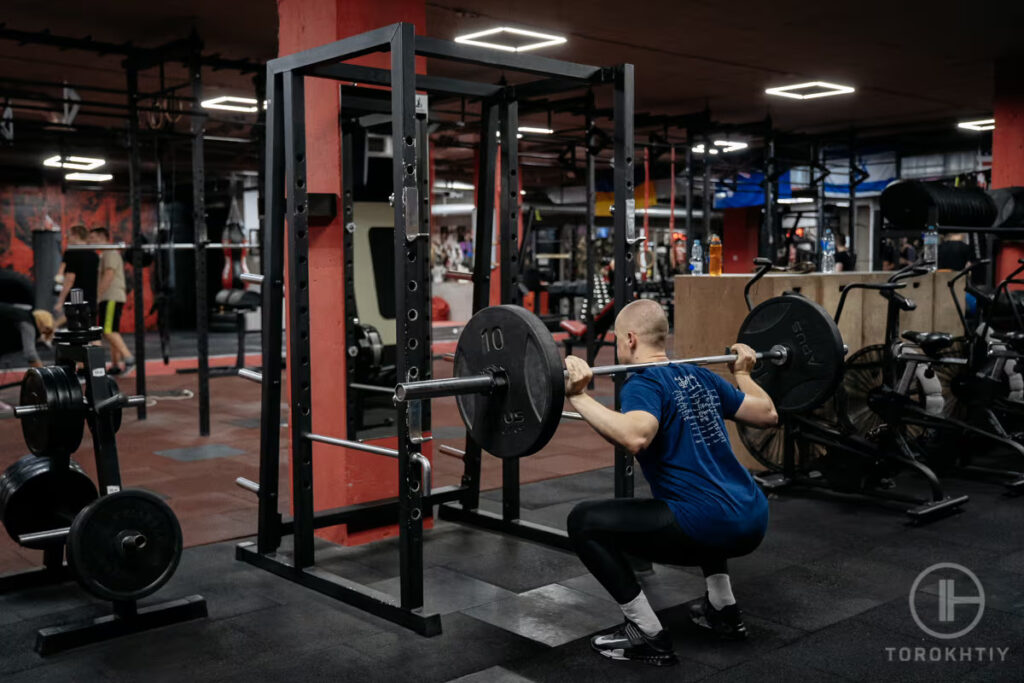
3. Main Benefits
While they can promote performance and endurance, they have different benefits. BCAAs can improve muscle recovery, and reduce DOMS. On the other hand, beta-alanine can help improve endurance, increase strength, and delay fatigue.
4. Pricing
Finally, the pricing might vary between each supplement (and brand). On average, BCAAs might cost you between $10-20. On the other hand, beta-alanine might cost between $10-25.
However, keep in mind that the prices might vary if you find beta-alanine and BCAA on their own, or with other ingredients.
With that said, if you are going to invest in a supplement, especially when talking about BCAAs, it’s better to spend on a high-quality whey protein powder. Not only will it have more BCAAs, have better pricing, but they can provide other benefits than BCAAs alone.
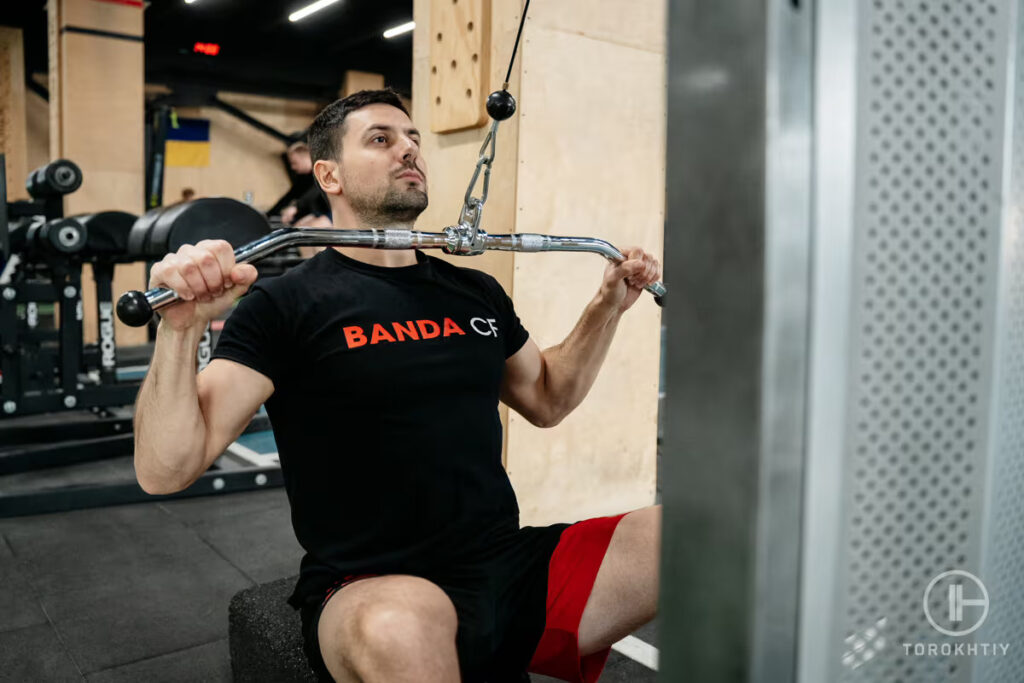
Beta-Alanine Vs. Bcaa: Summary
1. Pros/Cons of Beta-Alanine
Positives:
Could be better:
2. Pros/Cons of BCAA
Positives:
Could be better:
Beta-Alanine Vs. Bcaa: When To Use Each?
Both can be used to improve performance. So, when should you take them?
You can take BCAA during prolonged workout (triathlon, ultra) with your carbs and electrolytes or/and after a workout to help with recovery and DOMS. What matters in terms of muscle growth and muscle protein synthesis is that BCAA are better when combined with another protein source just like in Whey Protein Powder.
Beta-alanine works through consistency. It doesn’t matter when you take it, as long as you are consistent. You can take one dose a day or split it in a few – choose the most convenient option. You can mix it with your Creatine Monohydrate and enjoy their benefits.
1. Beta-Alanine We Recommend – Transparent Labs Beta-Alanine
Transparent Labs is one of the most trusted supplement companies due to its high-quality ingredients and transparent formula.
One scoop of the supplements provides 3,000 mg of beta-alanine, which is within the recommended dosage and perfect maintenance dosage for most. The benefit is that since it only contains beta-alanine, you can modify the dosage depending on your goals and needs, and mix it with other supplements like caffeine, whey protein or/and creatine monohydrate.
In addition, the company also has an “Informed Choice” certification, meaning it minimizes the risks of banned substances.
2. BCAA We Recommend – XTEND Sport BCAA Powder
If you are looking for a BCAA, we recommend XTEND Sport BCAA Powder. One scoop doesn’t have any calories, and it provides 3,500 mg of L-leucine, 1,890 mg of electrolyte blend (betaine anhydrous, sodium citrate, potassium chloride, sodium chloride, magnesium citrate, and coconut water), 1,750 mg of L-isoleucine, and L-valine.
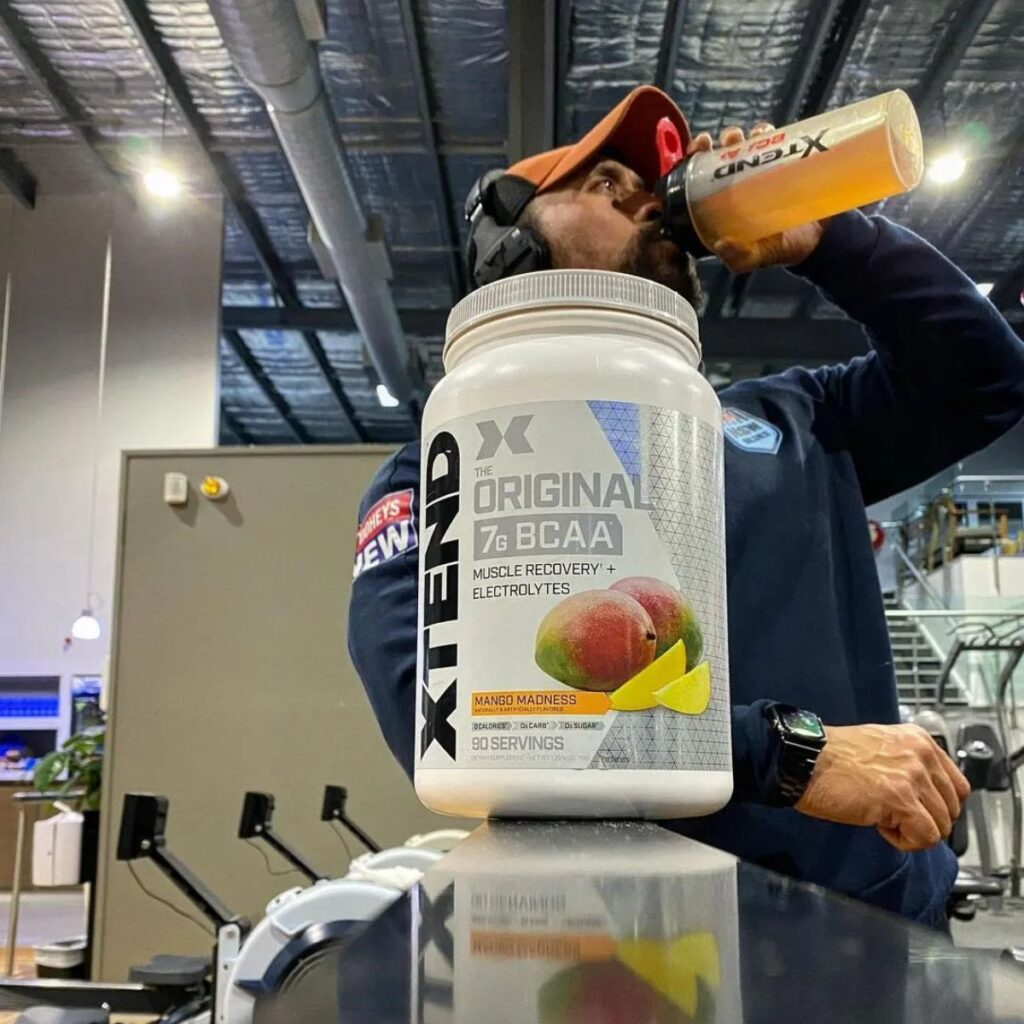
The formula comes in two delicious flavors to choose from: strawberry kiwi splash and blue raspberry ice.
One of the biggest benefits of XTEND Sport BCAA powder is that it is NSF-certified. This means that the product has been tested by a trusted independent certification organization to ensure its quality.
FAQ
When Should I Take Bcaa And Beta-Alanine?
You can take BCAA during or after a workout, while you can take beta-alanine any time during the day. Beta-alanine works through consistency since it has an accumulative effect.
Is Beta-Alanine Better Than Creatine?
No, they have different functions in the body. While beta-alanine can delay fatigue and improve endurance, creatine can help increase energy stores among many other benefits. The good news is that you combine both supplements to help improve performance and promote recovery.
Conclusion
Beta-alanine and BCAA are supplements that you can use to improve performance (Beta-alanine is a fatigue blocker) and delay muscle soreness – DOMS.
Now, most people have the question: is beta-alanine a BCAA?
Keep in mind that while both are amino acids, beta-alanine is a non-essential amino acid (the body can produce it), while BCAAs are a group of three essential amino acids (L-leucine, L-isoleucine, and L-valine), meaning they need to come through the diet.
Now, if you need to pick one, beta-alanine seems to have the most scientific evidence to back up its claims. While BCAAs have some evidence, the results are still mixed and inconclusive, meaning that they might not be as effective in improving performance as beta-alanine. That is why for most we suggest adding Whey Protein Powder into nutrition regime.
So, which of these two supplements do you consistently take? Let us know in the comments.
Also read:
- Do Electrolytes Help With Cramps
- Best Sports Drinks for Runners
- Best Electrolyte Drink for Keto
- Best No Flavor Electrolyte Powder
- Eaas or Bcaas
- Bcaa or L Glutamine
- Best Nac Supplement
- Best EAA Supplement
- Best Amino Acid Supplements
- Cellucor Bcaa Sport Review
References:
- Ondrej Cesak, Jitka Vostalova, Ales Vidlar, Petra Bastlova, Vladimir Student, Jr., “Carnosine and Beta-Alanine Supplementation in Human Medicine: Narrative Review and Critical Assessment” NCBI, https://www.ncbi.nlm.nih.gov/pmc/articles/PMC10096773/ (2023 Apr 28), 15(7): 1770.
- J Int Soc Sports Nutr, “Effects of β-alanine supplementation during a 5-week strength training program: a randomized, controlled study” NCBI, https://www.ncbi.nlm.nih.gov/pmc/articles/PMC5918575/ (2018 Apr 25).
- Eric A Newsholme 1, Eva Blomstrand, “Branched-chain amino acids and central fatigue” NCBI, https://pubmed.ncbi.nlm.nih.gov/16365097/ (2006 Jan 25), 136(1 Suppl):274S-6S. doi: 10.1093/jn/136.1.274S.
- Br J Pharmacol, “Branched‐chain amino acids differently modulate catabolic and anabolic states in mammals: a pharmacological point of view” NCBI, https://www.ncbi.nlm.nih.gov/pmc/articles/PMC5429325/ (2017 Jun), 174(11): 1366–1377.
- Yoshiharu Shimomura 1, Yuko Yamamoto, Gustavo Bajotto, Juichi Sato, Taro Murakami, Noriko Shimomura, Hisamine Kobayashi, Kazunori Mawatari, “Nutraceutical effects of branched-chain amino acids on skeletal muscle” NCBI, https://pubmed.ncbi.nlm.nih.gov/16424141/ (2006 Feb), 136(2):529S-532S. doi: 10.1093/jn/136.2.529S.
- Pedro Perim 1, Felipe Miguel Marticorena 1, Felipe Ribeiro 1, Gabriel Barreto 1, Nathan Gobbi 1, Chad Kerksick 2, Eimear Dolan 1, Bryan Saunders, “Can the Skeletal Muscle Carnosine Response to Beta-Alanine Supplementation Be Optimized?” NCBI, https://pubmed.ncbi.nlm.nih.gov/16424141/ (2019 Aug), 27:6:135. doi: 10.3389/fnut.2019.00135. eCollection 2019.
Why Trust Us?
With over 20 years in Olympic Weightlifting, our team does its best to provide the audience with ultimate support and meet the needs and requirements of advanced athletes and professional lifters, as well as people who strive to open new opportunities and develop their physical capabilities with us.
By trusting the recommendations of our certified experts in coaching, nutrition, dietology, and sports training programming, as well as scientific consultants, and physiotherapists, we provide you with thorough, well-considered, and scientifically proven content. All the information given in the articles concerning workout programming, separate exercises, and athletic performance, in general, is based on verified data. We ensure that you can rely on our professionals’ pieces of advice and recommendations that can be treated as personalized ones which will benefit you and fully meet your needs.
The product testing process is described in more detail here
Author: Jacek Szymanowski
Certified Nutritionist,
M.Sc.Eng. Biotechnology
Performance Architect,
Strength and Conditioning Specialist
With over 30 years of fighting experience, specialization in nutrition coaching for athletes, and expertise in metabolic health and dietary strategies, Jacek offers a comprehensive approach to optimizing your performance and well-being. Backed by a Master of Science degree in Biotechnology, Jacek remains at the forefront of scientific advancements, ensuring that his coaching is always evidence-based and up-to-date.

